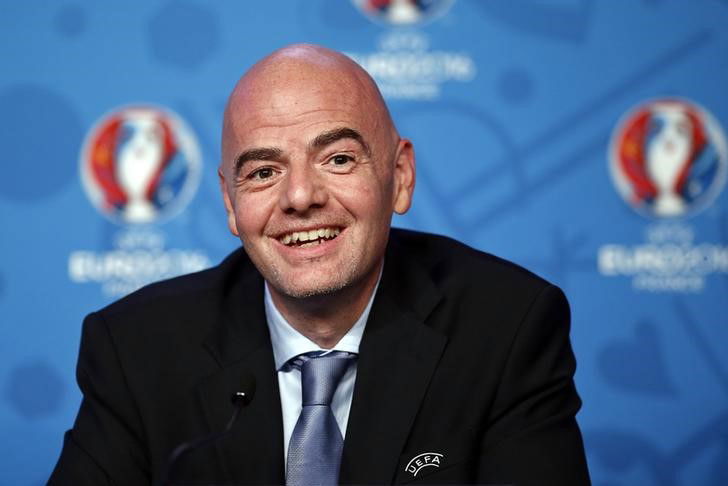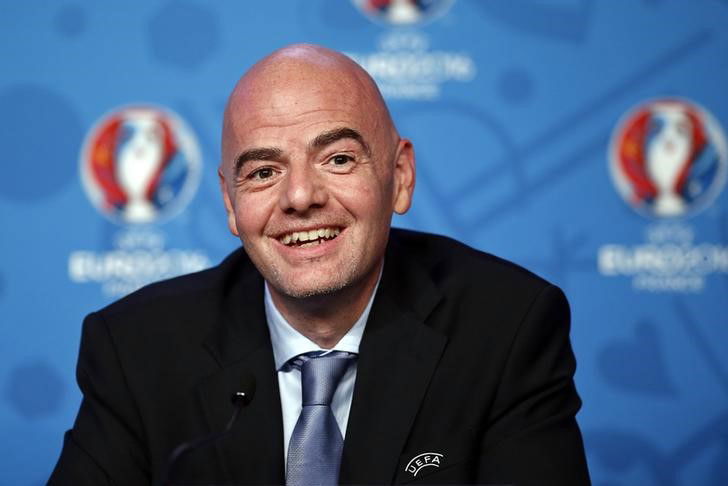
Reuters
FIFA presidential candidate Gianni Infantino attends a news conference after a meeting of UEFA’s executive committee, on the eve of the draw of the Euro 2016 finals, in Paris, December 11, 2015. REUTERS/Benoit Tessier/Files

Reuters
FIFA presidential candidate Gianni Infantino attends a news conference after a meeting of UEFA’s executive committee, on the eve of the draw of the Euro 2016 finals, in Paris, December 11, 2015. REUTERS/Benoit Tessier/Files

Reuters
FIFA presidential candidate Gianni Infantino attends a news conference after a meeting of UEFA’s executive committee, on the eve of the draw of the Euro 2016 finals, in Paris, December 11, 2015. REUTERS/Benoit Tessier/Files

Reuters
FIFA presidential candidate Gianni Infantino attends a news conference after a meeting of UEFA’s executive committee, on the eve of the draw of the Euro 2016 finals, in Paris, December 11, 2015. REUTERS/Benoit Tessier/Files
By Brian Homewood
Watch What’s Trending Now!
BERNE (Reuters) – FIFA presidential candidate Gianni Infantino suggested expanding the World Cup to 40 teams and following the example of the European championship by spreading it across several countries to share out the “honour and benefits” of the tournament.
The Swiss, general secretary of European soccer body UEFA, backed proposed reforms for soccer’s scandal-plagued world governing body which included term limits for the president and leading officials and public disclosure of their remuneration.
Laying out his plans for the February 26 election, he also proposed that FIFA should aim to distribute half of its revenues directly to its 209 member associations to be spent on the development of the sport.
Infantino, a 45-year-old multilingual lawyer, is one of five candidates standing in an election taking place amid the worst crisis in FIFA’s history.
Forty-one individuals, many of them national association presidents, and entities have been indicted in the United States and FIFA’s own ethics committee has banned leading officials including president Sepp Blatter, barred for eight years.
Infantino’s reform proposals for cleaning up FIFA were broadly similar to those that will be put before the Congress on Feb. 26.
Infantino, who was on the committee which helped draw up proposed reforms for FIFA last year, backed a proposal to restrict the FIFA president and executive committee members to three four-year terms each, which is considered a key element.
Blatter had been president for 17 years when he was banned in December.
“This will ensure a regular influx of new ideas into the institution…(and)….will also help to address some widely voiced public criticism of the organisation,” said the manifesto.
Other suggested measures included “a fully open tendering process for commercial and operational contracts” and a “proper institutional framework to ensure full transparency of money flows.”
The four-yearly World Cup currently involves 32 teams, which many critics feels is the ideal number both logistically and in terms of quantity, but Infantino said he wanted to add another eight.
“We would be giving eight more countries the possibility to enjoy the World Cup fever in a more passionate way, also achieving greater worldwide representation in the process,” said the manifesto.
He proposed a rotation system under which any given continent could stage a maximum of one in every three World Cup tournaments.
RIVALS
Infantino said he would also encourage the idea of co-hosting World Cup tournaments between two or more countries in the same region “so enabling several countries to enjoy the honour and benefits of hosting the World Cup.”
The idea has been pioneered by UEFA, who will stage Euro 2020 in 13 cities around Europe and co-hosted its tournaments in 2000, 2008 and 2012.
The only time the World Cup has been shared by more than one country was 2002 when it was co-hosted by Japan and South Korea.
Infantino said he wanted to distribute $5 million every four years to each of FIFA’s 209 member assocations for football development and a further $40 to each of the continental confederations. He said he would also set up a travel fund to help pay expenses for remote nations.
Asian Football Confederation president Sheikh Salman Bin Ebrahim Al Khalifa, former FIFA deputy general secretary Jerome Champagne of France, South African businessman and politician Tokyo Sexwale and Jordanian former FIFA executive committee member Prince Ali Bin Al Hussein of Jordan are Infantino’s rivals.
Each of FIFA’s national associations holds one vote and there are no clear favourites to win although Infantino would have a head start if he were to capture the majority of the 53 European votes. He also says he has major support in the Caribbean region, which has 25 votes.
The shaven-headed Infantino joined UEFA in 2000 and has been general secretary since 2009.
(Editing by Ralph Boulton)

